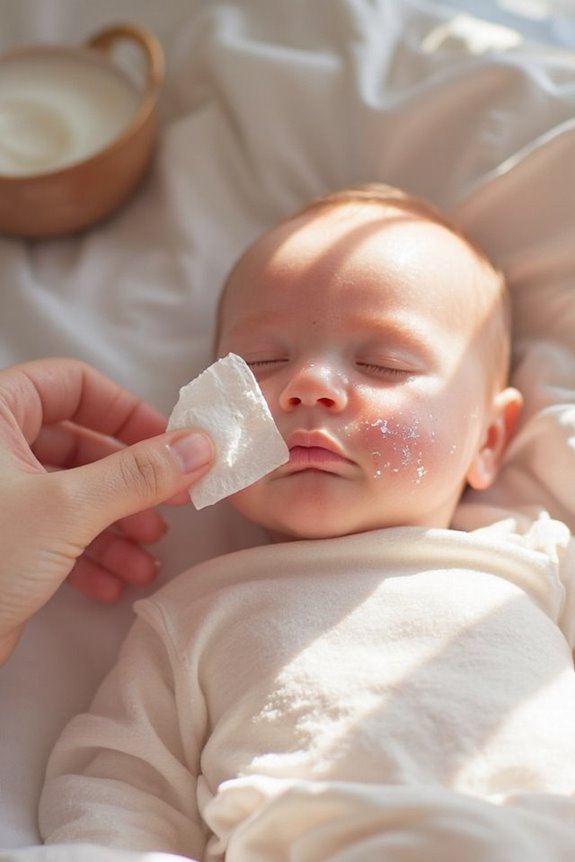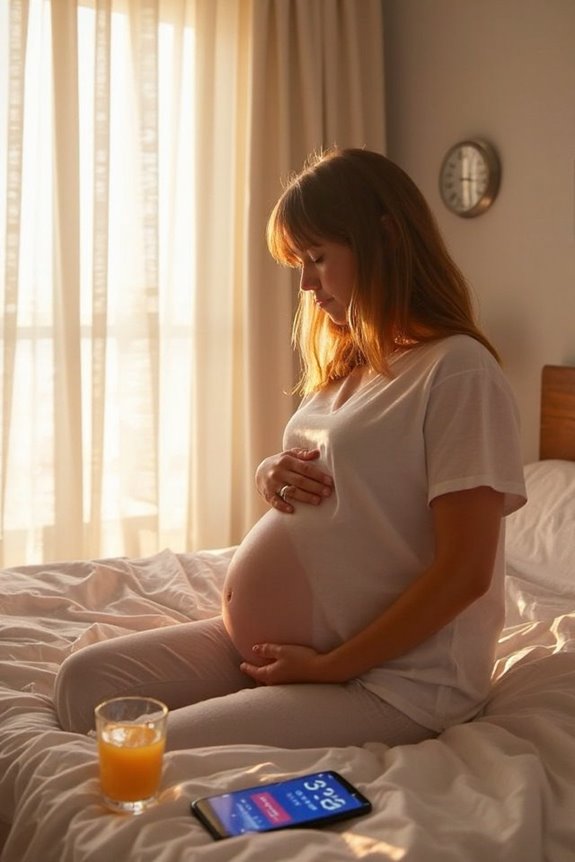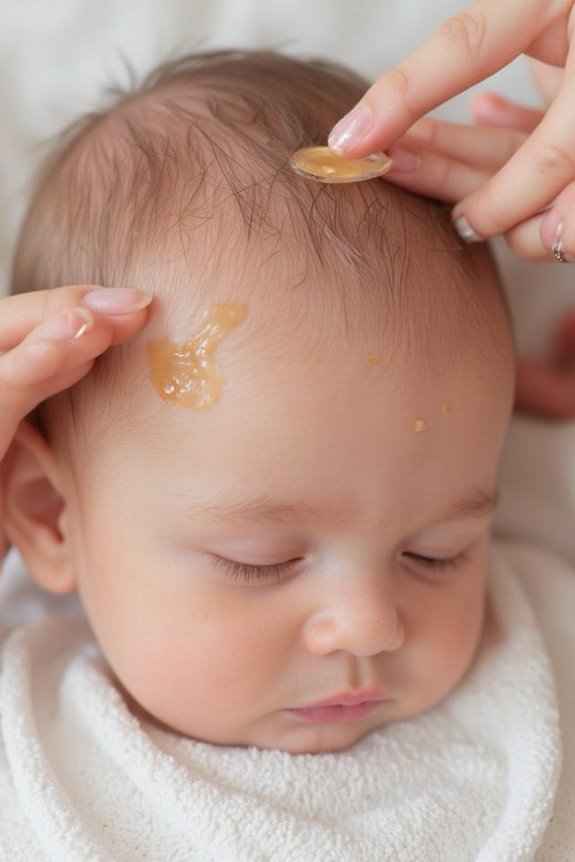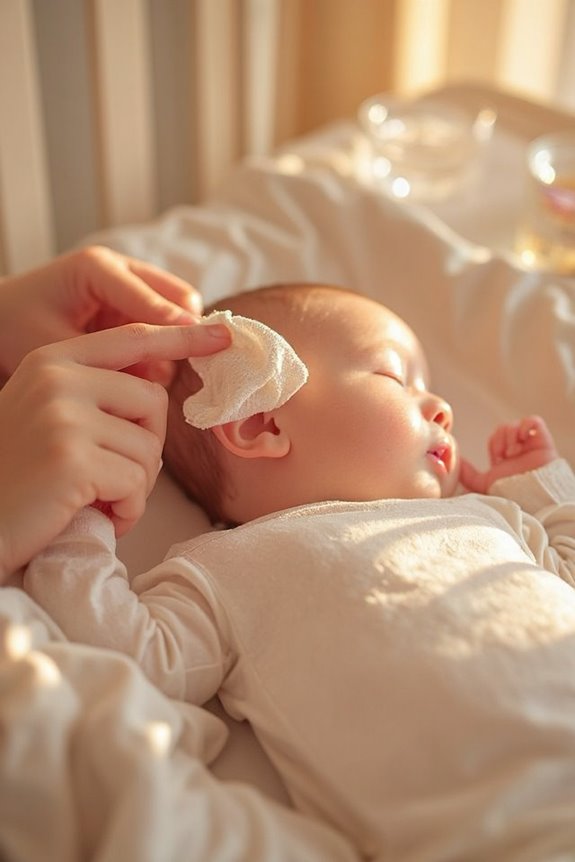For most babies, acne resolves naturally without treatment. I recommend a gentle approach: clean your baby’s face daily with warm water and mild, fragrance-free cleansers, patting dry with a soft towel. Avoid over-washing, harsh products, and scrubbing the bumps. If acne persists beyond 3 months, shows signs of infection, or causes discomfort, consult your pediatrician. The right care routine can make a significant difference in your little one’s skin health.
Key Takeaways
- Gently cleanse your baby’s face once daily using warm water and mild, unscented baby cleansers.
- Avoid over-washing or scrubbing affected areas, as this can irritate skin and worsen acne.
- Keep your baby’s face clean after feedings to prevent milk residue from clogging pores.
- Consult your pediatrician if acne persists beyond 6-12 months or shows signs of infection.
- Apply appropriate moisturizers formulated specifically for newborn skin to maintain hydration without clogging pores.
Understanding the Causes of Infantile Acne
While many parents worry when they notice small bumps on their baby’s face, understanding what causes infantile acne can help ease these concerns.
The primary trigger involves hormonal influences from both mother and baby. During pregnancy, maternal androgens cross the placenta and stimulate your baby’s sebaceous glands. After birth, these hormones can persist in your infant’s system, particularly in boys.
This hormonal activity leads to:
- Overactive sebaceous gland activity
- Increased sebum (oil) production
- Blocked pores
- Potential bacterial growth
Genetics also play a significant role. If you or your partner had acne as teenagers, your baby may be more susceptible to infantile acne. Environmental factors like harsh soaps or friction from clothing can further aggravate the condition.
Recognizing Different Types of Baby Acne
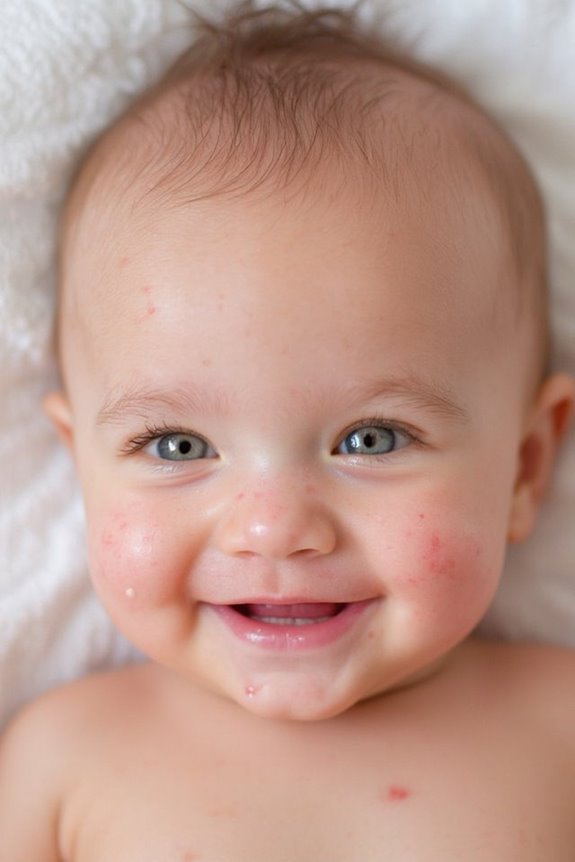
Most parents don’t realize that baby acne comes in different forms, each with distinct characteristics and timelines.
Neonatal Acne
- Appears within first 6 weeks after birth
- Affects up to 20% of newborns (more common in boys)
- Shows as small red/white bumps on cheeks, chin, and forehead
- Typically resolves without treatment or scarring
Infantile Acne
- Develops between 6 weeks and 16 months of age
- Features both comedones (blackheads/whiteheads) and inflammatory lesions
- Primarily affects the cheeks
- May require medical evaluation, especially if severe
I’ve found that parents often confuse baby acne with other conditions like eczema, allergic reactions, or even infections. Knowing the difference helps determine whether you should consult your pediatrician.
Essential Daily Skincare for Babies With Acne
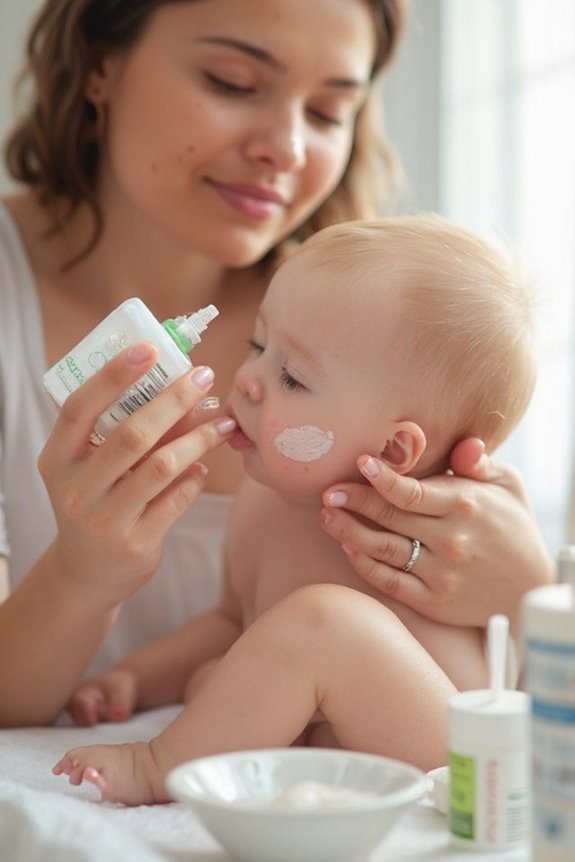
Caring for a baby with acne requires a gentle approach that won’t irritate their delicate skin. I’ve found that establishing a simple daily cleansing routine is essential for managing baby acne effectively.
For your skincare routine:
- Use warm water and mild, unscented baby cleansers
- Gently pat skin dry with a soft towel
- Apply non-irritating moisturizers formulated for newborns
- Clean your baby’s face after feeding to prevent residue buildup
Avoid these common mistakes:
- Over-cleansing, which strips natural oils
- Using adult products or acne treatments
- Scrubbing or picking at acne
- Applying greasy or oily products
Always consult your pediatrician before trying any treatments, including natural remedies like breast milk or cool compresses. With consistent care, most baby acne resolves on its own.
Gentle Topical Treatments for Mild Cases
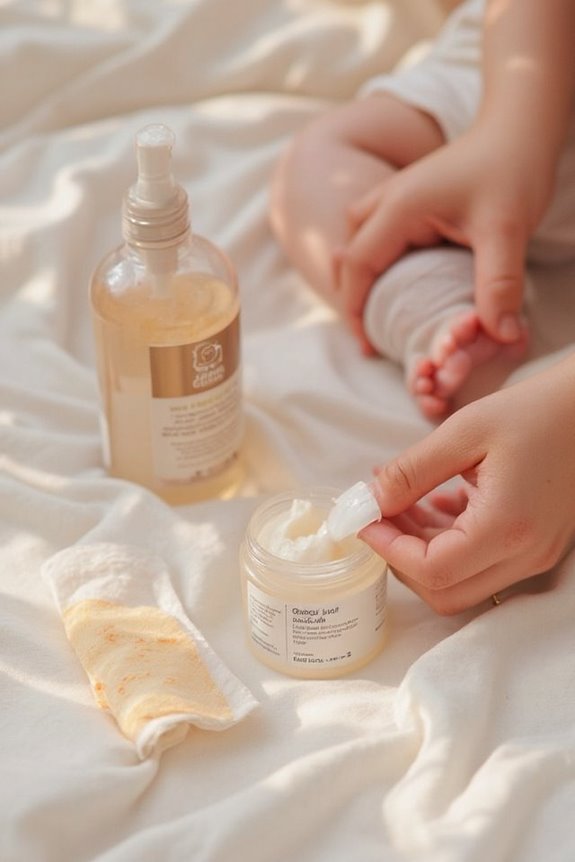
For babies with mild acne, gentle topical treatments can provide relief without harsh side effects. I always recommend consulting your baby’s healthcare provider before applying any topical solutions to their delicate skin.
When choosing treatments, look for:
- Products specifically formulated for infant skin
- Gentle formulations with natural, plant-based ingredients
- Dermatologically tested options
Avoid over-the-counter acne treatments designed for teens or adults, as these contain harsh chemicals that can damage your baby’s sensitive skin. Instead, if your pediatrician recommends intervention, they may suggest mild medicated creams specifically for infants.
Remember to monitor your baby’s skin closely after applying any topical treatment. If redness or irritation increases, discontinue use immediately and consult your healthcare provider for alternatives.
When to Consider Medical Intervention
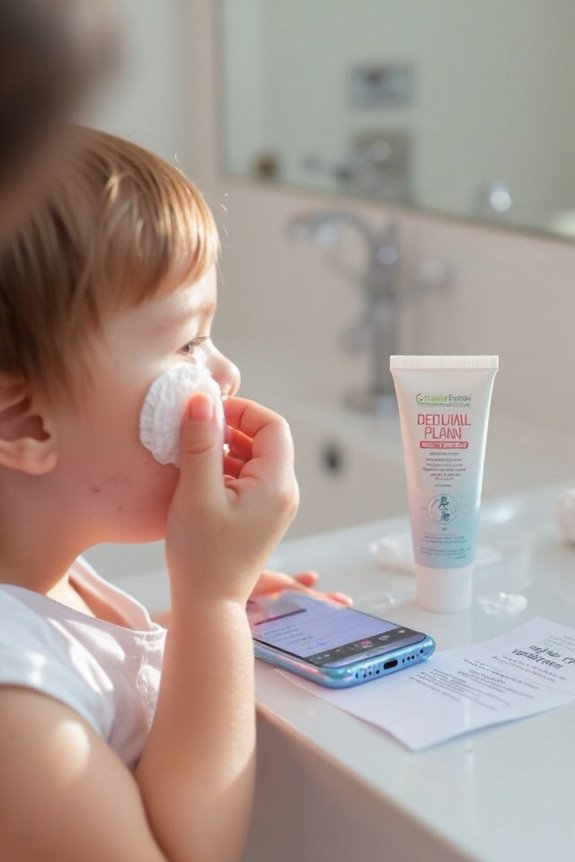
While most cases of baby acne resolve on their own, how do you know when it’s time to seek professional help?
I recommend contacting your pediatrician if you notice:
- Signs of infection: Increased redness, swelling, tenderness, or pus drainage from acne areas
- Persistent acne: Breakouts lasting longer than 6-12 months or frequently recurring despite gentle care
- Skin inflammation: Noticeable irritation that doesn’t improve with basic care, especially if accompanied by follicular lesions or skin thickening
When medical intervention is necessary, treatment options may include:
- Antifungal creams like ketoconazole
- Topical antibiotics such as erythromycin gel
- Benzoyl peroxide for mild bacterial acne
Don’t hesitate to seek professional guidance if your baby’s acne worsens or if fever develops, as this might indicate a systemic infection requiring immediate attention.
Preventing Scarring and Complications
Although baby acne typically clears up without leaving permanent marks, proper care is essential to prevent potential scarring and complications.
For effective scarring prevention:
- Never squeeze or pop baby acne bumps
- Cleanse with lukewarm water and mild soap
- Gently pat skin dry instead of rubbing
- Avoid harsh chemicals and fragrances
Proper complication management includes:
- Consulting your pediatrician if acne seems severe
- Avoiding adult acne treatments on baby’s sensitive skin
- Using a humidifier to prevent skin dryness
- Establishing a gentle daily skincare routine
I recommend keeping your baby’s environment clean and using only fragrance-free, hypoallergenic products designed specifically for infants. Regular monitoring for signs of infection or irritation will help maintain your baby’s skin health while the acne naturally resolves.
Natural Remedies and Home Care Approaches
Many parents seek gentle, natural approaches to manage their baby’s acne without resorting to medications. I recommend establishing a daily cleaning routine using lukewarm water and mild cleanser options specifically formulated for delicate baby skin.
When bathing your little one:
- Use soft washcloths and pat dry instead of rubbing
- Avoid scrubbing or picking at blemishes
- Keep washing gentle to preserve natural skin oils
Coconut oil benefits include moisturizing properties that can soothe irritated skin, though you should always test a small amount first to check for allergic reactions. Before trying any natural remedies, consult your pediatrician for guidance.
Remember that over-cleaning can actually worsen acne by stripping protective oils, so maintain a balanced approach to skincare with products free from harsh chemicals or fragrances.
Creating a Comprehensive Treatment Plan
Because baby acne can present differently from child to child, you’ll need a tailored approach that addresses your baby’s specific symptoms. I recommend establishing treatment timelines with your pediatrician to track progress effectively.
Your plan should include:
- Daily gentle cleansing with lukewarm water
- Avoiding harsh products and scrubbing
- Regular monitoring for skin changes
- Following prescribed treatments precisely
Healthcare collaboration is essential for successful management. Always consult your pediatrician before applying any treatment, including medicated creams or antifungal agents like ketoconazole. For neonatal acne, patience is often sufficient as it typically resolves within weeks, while infantile acne may require more intervention.
If the condition persists or worsens despite treatment, consider requesting a referral to a dermatologist for specialized care.
Frequently Asked Questions
Can Infantile Acne Be Linked to Food Allergies?
I believe infantile acne can sometimes be confused with food allergy symptoms. While true acne is hormonal, certain acne-like rashes may be triggered by food allergies, appearing as similar skin reactions.
Is Baby Acne Contagious to Other Family Members?
Just like a fleeting storm, baby acne isn’t contagious to family members. I’m here to dispel baby acne myths—it can’t spread through contact. Your family health isn’t at risk when snuggling that adorable face!
Will Baby Acne Affect My Child’s Self-Esteem Later?
Baby acne doesn’t typically affect your child’s self-esteem later. Your parental influence matters more – how you respond to skin issues now helps build your baby’s self-esteem foundation for the future.
Does Baby Acne Indicate Future Teenage Acne Problems?
While those tiny facial concerns may worry you, I’m happy to share that neonatal acne typically doesn’t predict future breakouts. However, infantile acne might suggest a genetic predisposition, so establishing good skincare routines early is beneficial.
Can Environmental Factors Like Pollution Worsen Infantile Acne?
Yes, I believe pollution effects can worsen infantile acne. Air pollutants may irritate your baby’s sensitive skin, causing inflammation. I’d recommend gentle skin care and minimizing exposure to polluted environments when possible.

